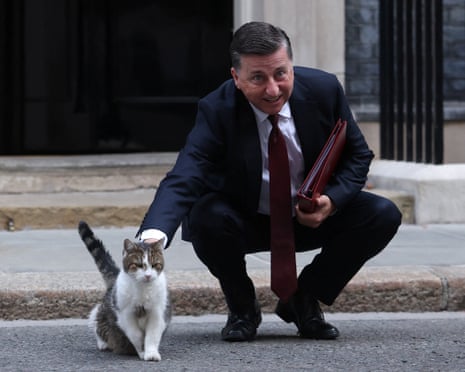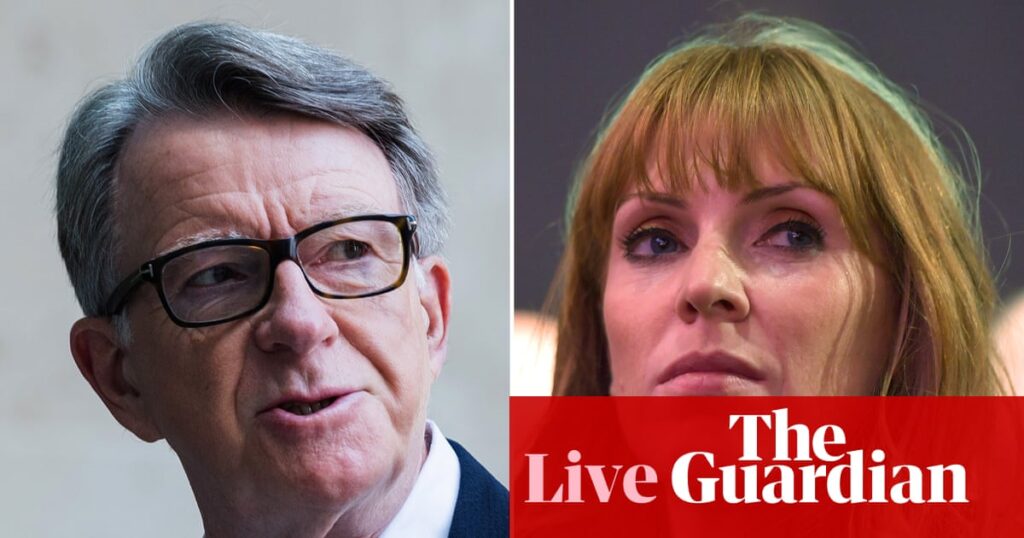Labour MPs despondent after turbulent week, says cabinet minister
Douglas Alexander said he understood that Labour MPs would be “despondent” as a result of two significant departures in the past two weeks.
The Scotland secretary told BBC Breakfast:
Many of us were devastated by Angela Rayner’s departure from the government last week. She’s an extraordinary woman who’s overcome the most extraordinary challenges and we are grieving and feel quite acutely that sense of loss.
Now to have the dismissal of Peter Mandelson just the next week, I totally get it, of course Labour MPs will be despondent that in two weeks in a row we have seen significant resignations from public service.
These are not the headlines any of us in government or in parliament would have chosen or wanted. But the fact is when the evidence emerged, action had to be taken and we are looking forward, therefore, to moving on.
He added that “while the politics is really hard”, there were still “policy achievements under way”.

Meanwhile, the new housing secretary has said that the government is “absolutely committed” to its pledge to build 1.5m new homes in England by 2029.
Steve Reed said the government was standing firm behind the vow, which was part of Labour’s pre-election manifesto, telling the BBC: “It’s what we’re going to do.”
Reed told the broadcaster:
We’ll do it by working in partnership with the developers and with the builders. My job is to get every barrier out of the way that is stopping that construction going ahead.
More on both of these stories in a moment, but first here are some other key developments:
-
The UK economy flatlined in July, according to official figures, in grim news for Rachel Reeves as she gears up for a challenging budget. It was a slowdown compared with June, when the economy grew by 0.4%, according to the Office for National Statistics.
-
Britain will not rejoin the EU in the foreseeable future, according to the minister who has piloted Keir Starmer’s recent reset of European relations. Nick Thomas-Symonds said he could not see the country re-entering the bloc in his lifetime, despite the thaw in continental relations that he has helped bring about.
-
Up to 400 large shops are at risk of closure with as many as 100,000 jobs at risk if the government goes ahead with plans to hit stores with higher business rates, retailers have warned. Some of the UK’s largest retail premises, including supermarkets and department stores, would face higher property tax charges under new rules being considered by the government before November’s budget.
-
Transport for London has invited the RMT to resume talks as the union’s week of strikes comes to a close, with the tube expected to restart gradually, with early disruption, on Friday. The RMT did not confirm whether it would accept TfL’s invitation to further talks next Wednesday, after saying further strikes could follow.
-
Special needs reforms for children in England could turn into “welfare reforms mark 2” unless the government can convince parents that it is not aiming to save money, according to a report by the Institute for Fiscal Studies. The thinktank said any changes to the current system of education, health and care plans (EHCPs), which mandate tailored support for children with special needs, will be highly controversial among parents, but said reform was “long overdue” as the number of EHCPs issued has ballooned by 80% since 2018.
-
Hospices are “on the brink” and two in five are making cuts this year despite the importance of end-of-life care if assisted dying becomes legal, the sector has warned before the first House of Lords debate on the legislation. The terminally ill adults (end of life) legislation is due to have its second reading in the House of Lords on Friday.
Key events

Libby Brooks
The newly-appointed Scottish secretary Douglas Alexander has told off Scotland’s first minister for “playing politics” over Scotch whisky tariffs.
Earlier this week, Swinney briefed the media on his “very substantial” meeting with Donald Trump at the White House, saying that he had succeeded in pushing Scotch tariffs up the US president’s agenda where the UK government had failed.
Swinney was accompanied to the meeting by Peter Mandelson in one of his last duties before he was sacked at US ambassador.
In a statement released overnight on Friday, Alexander warned:
With president Trump’s state visit just days away, we all need to put Scotland’s economy first – not political point scoring.
Later, he told BBC Scotland:
When [Swinney] said that he had put whisky on the agenda, with great respect, we’d already done a deal with India, where whisky was a central feature of that deal.
We’ve had negotiators on the ground in Washington every day this week, and because we’ve shared that information with him, he’s fully aware that long before John Swinney arrived in the Oval Office, we were talking with and engaging with the US administration on the issue of whisky.
The Irish taoiseach Micheal Martin said “very good progress” has been made to reach an agreement with the UK on dealing with the legacy of the Northern Ireland troubles.
Martin made the comments after what he was described as a “very warm and constructive” meeting with prime minister Keir Starmer at Chequers on Friday morning.
“We discussed a broad range of matters, including the positive relations between our two countries and the extensive programme of bilateral co-operation under way between our two governments, including in preparation for the upcoming UK-Ireland summit, which will take place in Ireland in the spring,” he said.
“Very good progress has been made on legacy and the Prime Minister and I agreed that we are close to setting out a framework to address legacy issues, recognising its importance to victims and survivors, and to the wider community in Northern Ireland and across these islands.
“We discussed the catastrophic situation in Gaza – the need for a ceasefire, release of all hostages and a massive surge in humanitarian aid. We also committed to continue working together with the coalition of the willing to strengthen support for Ukraine and increase pressure on Russia to stop its war of aggression on the people of Ukraine.”

Mark Sweney
The chief executive of Barclays has said the UK government needs to limit pay rises for public sector workers and resist a further “squeeze” on banks with tax increases.
CS Venkatakrishnan said the government needed to look at its own spending levels as the chancellor, Rachel Reeves, seeks ways to address a fiscal hole when she announces her budget in November.
“We need to curb expenditure at the government level,” he told the Financial Times. “We need to find a way to curb wage inflation.”
Venkatakrishnan said that, while the government needed to restrict rising “public sector” wages, the inflationary impact of pay rises was an issue across the UK economy.
While UK wage growth has slowed in recent months it is still running at an annual rate of 5.7% in the public sector, excluding bonuses. Private sector wage growth is running at an average of 4.8%.
Venkatakrishnan also said that the banking sector should not be a target of further taxation. “UK banks are taxed more than banks anywhere else,” he said. “How much more are you going to squeeze this?”
Banks are concerned that the industry’s reliable profits, fuelled by higher interest rates, could make it one of the targets for tax increases as Reeves comes under pressure to raise taxes to address a hole in her fiscal plans.
Last month, UK bank shares tumbled, cutting the combined market value of some of the biggest companies in the sector by more than £6bn, as fresh calls for a windfall tax on large lenders in the budget spooked investors.

Sandra Laville
A coalition of civil society groups is warning of the dangers of cutting safety regulations as the government pushes to “rip up the rules” to accelerate the construction of new nuclear power stations.
The 25 groups from communities neighbouring nuclear sites have submitted a joint response to a consultation by the nuclear regulatory taskforce, saying its proposals lack “both credibility and rigour”.
They argue that the plans to relax regulations only serve to undermine confidence in regulators and the UK’s nuclear regulatory regime.
The government is pushing to speed up approvals for new plants and says it needs to “rip up rules” to “fire up” nuclear power.
But the groups, in their submission to the taskforce, which published its interim report in August, argue that the government has failed to present any evidence to substantiate assertions about the need to reform nuclear safety regulation.
In reality, they say, the problems facing the UK’s nuclear programmes are the result of a multitude of factors, including poor planning, investment difficulties, and slow decision-making by industry and central government.

Peter Kellner
On the morning of 16 March 1976, Robert Worcester – universally known as “Bob” – received the phone call that converted him from the head of a little-known market research company into the public face of polling in Britain. The call was from Harold Evans, the editor of the Sunday Times. Harold Wilson had just announced his retirement at prime minister. Evans wanted to find out whom voters wanted as the next Labour leader. Who better to conduct the survey than Labour’s own private pollster: Worcester himself?
The poll, showing James Callaghan well ahead, provided the front-page lead for the following Sunday’s paper. In those days party leaders were elected by MPs. The poll helped Callaghan’s cause – and did Worcester himself no harm, for Callaghan was duly elected, and kept him as the party’s pollster.
You can read the full obituary of the founder of the market research company Mori, whose snappy analysis made him the go-to pollster for the British media, at the link below:
Farage suggests that Starmer ‘ignored the warnings’ about Peter Mandelson
Nigel Farage has suggested Keir Starmer “ignored the warnings” about Peter Mandelson, who was sacked from his role as ambassador to the US this week, reports the PA news agency.
Lord Mandelson was removed from his post after emails emerged in which the peer offered support to Jeffrey Epstein even as he faced jail for sex offences.
Starmer, who had said he had “full confidence” in Mandelson before the emails were published, now faces questions over what he knew and when about the ex-ambassador’s ties to Epstein.
Speaking as part of a Reform UK press conference in Caerphilly, Farage said:
I’m not saying Mandy has done a bad job over there but I think we have the good fortune of a pro-British presidency.
Look, Peter Mandelson – he’s a very clever bloke, he’s a very knowledgable bloke. But, clearly, he does have one or two demons. Twice before he’s been removed from cabinet. This is the third time he’s been removed.
Mandelson’s friendship with Epstein had been known prior to his appointment, but Bloomberg and the Sun published emails showing the relationship continued after his crimes had emerged.
Farage said:
I just don’t know what the intelligence briefing that Morgan McSweeney, the right-hand man to the prime minister, and the prime minister got, but you sort of begin to get the feeling that the PM ignored the warnings, carried on without really having much support in his own party, and then it took him quite a long time to actually remove Lord Mandelson.
So, it’s kind of left the PM and McSweeney, his right-hand man, in a very difficult position with their own parliamentary party.
Today’s schedule
Here is the agenda for the day:
Friday: Yvette Cooper is in Kyiv for the first overseas visit in her new role as foreign secretary.
Friday: Dealing with the legacy of Northern Ireland’s troubled past, relations with the EU and Gaza are to be discussed during a meeting between prime minister Keir Starmer and Irish premier Micheál Martin.
10am: The assisted dying bill will be debated in the House of Lords for the first time on Friday. Demonstrations outside parliament are expected.
Mid-morning: Conservative party leader Kemi Badenoch to visit Addenbrookes in Cambridge alongside shadow health secretary Stuart Andrew and mayor Paul Bristow.
6pm: Turning Point UK will hold a vigil in Whitehall for murdered US right-wing activist Charlie Kirk.
The House of Commons will not be sitting.
In case you missed it, here is the Guardian view on Peter Mandelson in Washington:
The Liberal Democrats have called for the Commons foreign affairs committee to scrutinise the next US ambassador after sacking of Peter Mandelson.
Lib Dem foreign affairs spokesperson Calum Miller said:
The prime minister’s appointment of Mandelson was a clear error of judgment, a mistake that we cannot afford to let him repeat.
With Trump in the White House, we need an ambassador who will stand up to the president and represent British values.
To avoid further national embarrassment for our country on the international stage, the foreign Aaffairs committee must now have a role in scrutinising Mandelson’s successor before they are appointed.

Patrick Wintour
Keir Starmer has spoken to Abdel Fatah al-Sisi amid reports the Egyptian president has directed his officials to study an internal request to grant a pardon to release the British-Egyptian human rights activist and writer Alaa Abd el-Fattah.
Abd el-Fattah’s British-based family are not commenting on developments save to say they are praying for his release.
The readout of Wednesday’s phone call between Sisi and Starmer focused on the Israeli bombing of Hamas members in Qatar, the threat of a mass displacement of Palestinians in Gaza and preparations for the UN conference this month on a two-state solution to the Israeli-Palestinian conflict on which the UK and Egypt have been closely cooperating. Sisi welcomed the UK decision to recognise a Palestinian state.
The Downing Street readout also referred to steps to strengthen bilateral ties in the future. The release of Abd el-Fattah is a Foreign Office priority. The two leaders last spoke in July.
Hopes of a pardon were ignited by Egypt’s official National Human Rights Council making a call this week for his release and six other named prisoners, arguing a pardon would contribute to the stability and psychological balance of his family.
It is expected a decision will be taken in a few days. The move represents the most optimistic development in his ordeal since he was arrested six years ago for endorsing a social media post about the death of a prisoner. He was charged with broadcasting false news.

Michael Savage
The BBC has come under renewed pressure over the amount of coverage dedicated to Reform UK after an analysis showed Nigel Farage’s party featured in a quarter of all News At Ten bulletins over six months.
Reform featured in 49 bulletins between January and July this year, whereas the Liberal Democrats – the third party in parliament with 72 MPs – featured in 17.9% of bulletins, with 35 references.
The Cardiff University study found Reform was referenced in just under a fifth of ITV News At Ten bulletins, compared with 6.2% for the Liberal Democrats, meaning Reform was covered three times more.
The study of the two bulletins also raised questions about the scrutiny of Reform. In just under a fifth of cases, there was no analysis of Reform’s policies or claims. They were rigorously scrutinised in just under four in 10 cases, and to some extent in another four in 10 cases.
More than two-thirds of references to Reform featured some footage of its politicians, including Farage in a pub.
The corporation has already released a lengthy riposte to claims it was giving too much attention. It pointed out earlier this month that Reform had been the main beneficiary of a collapse in polling support for the two main parties and performed strongly in local elections, as well as leading opinion polls.
Confronted over the issue this week, the BBC director general, Tim Davie, insisted the corporation was not trying to ingratiate itself with Reform with increased coverage.
The study, however, raises questions about the relative coverage given to the two parties. On the rare occasions when stories included substantial Liberal Democrat claims, they received either high-level or some degree of scrutiny in half of them.
Peter Mandelson’s career was described as durable to an audience of foreign policy top brass just five days ago, writes the Guardian’s diplomatic editor, Patrick Wintour.
Here he writes about the ambassador whose panache made him a big hitter in Washington DC:

